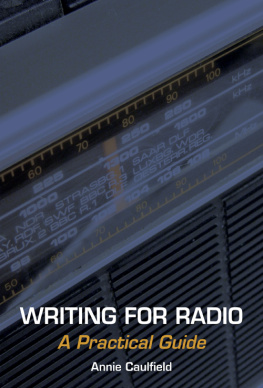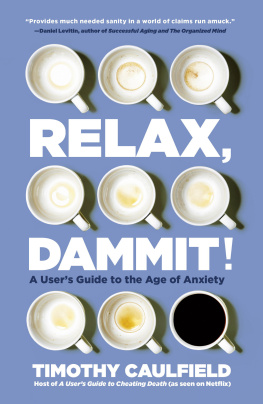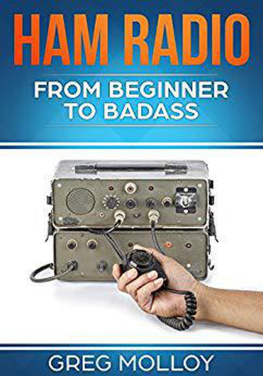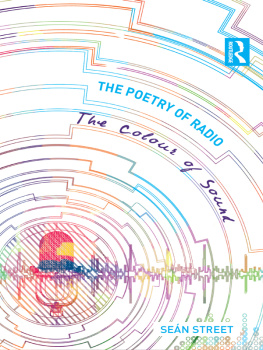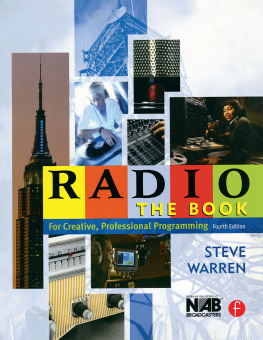WRITING FOR RADIO
A PRACTICAL GUIDE
WRITING FOR RADIO
A Practical Guide
Annie Caulfield
THE CROWOOD PRESS
First published in 2009 by The Crowood Press Ltd, Ramsbury, Marlborough, Wiltshire, SN8 2HR
www.crowood.com
This e-book edition first published in 2011
Annie Caulfield 2009
All rights reserved. This e-book is copyright material and must not be copied, reproduced, transferred, distributed, leased, licensed or publicly performed or used in any way except as specifically permitted in writing by the publishers, as allowed under the terms and conditions under which it was purchased or as strictly permitted by applicable copyright law. Any unauthorised distribution or use of this text may be a direct infringement of the authors and publishers rights, and those responsible may be liable in law accordingly
ISBN 978 1 84797 330 6
C ONTENTS
I NTRODUCTION
Theres a clich about radio drama Ive heard more times than even a clich should be heard: I like radio, the pictures are better. I understand what this means; I just dont think its right. It isnt fair to radio to make it compete with visual media; it is equal, but different. It doesnt need to make excuses for itself by pretending to have the attributes of other forms.
With the special intimate quality of radio we return, however technologically complex the production, to the human voice telling us a story. We remember how evocative sounds, isolated or in composition, can be for us. We are reminded how much power there can be in a single word.
The difference between the right word and the nearly right word is the same as that between lightning and the lightning bug.
Mark Twain
This book aims to be of interest to curious radio listeners as well as writers. It is written with passion as well as expertise gleaned from producers, writers, directors and technicians far more experienced than myself. Writing for radio documentary, soaps, panel shows and comedy are all addressed in this book, but the main topic is writing radio drama. Most of the suggestions about how to write successful radio drama apply to speech radio in general.
People love stories, and there is no better or more intimate medium for the telling of stories than radio. A good radio drama feels like it is being performed for you and you alone. There is no sense of sitting down to share a dramatic experience that you get when going to the cinema or theatre. The radio drama experience is one where you eavesdrop, alone, to a drama playing out on the airwaves, and when the story is strong and the characters compelling, there is no more powerful medium in the world.
But of course we can never take radio drama for granted; in radio terms drama is expensive, and in many countries it has already withered and died. But in Britain, with its strong dramatic tradition, and the realization that the medium is a breeding ground for writers and actors, radio drama will survive, I trust, as long as radio exists as a medium.
Gordon House, Former Head of BBC World Service Drama
1 W HY W RITE A R ADIO P LAY ?
A television producer once told me that I was wasting my time writing radio drama. They described it as a sideshow of a sideshow.
Radio drama may not pay dizzying sums, or bring immediate fame and glittering prizes. It might bring a line in the Radio Times rather than a name in lights, but for writers, radio is a place where they are treated as being at least as important as the studio runner; they can be involved in the process from start to finish and they can have a production realized that comes very close to the production they imagined.
Radio has been a way in to a career as a dramatist for many successful writers and is revisited by just as many who are far above the sideshow level of their careers. Tom Stoppard, Edward Bond, Howard Barker, Anthony Minghella, Peter Barnes, Roy Williams, Sarah Daniels, Mark Ravenhill, Lee Hall theres a very long list of contemporary writers who dont think radio is too obscure or old hat, who choose to revisit to the mediums special qualities.
The limits on radio drama are those we put on it ourselves: habit, low expectations, our preference for the familiar and, well, the usual shortage of genius.
John Taylor, Creative Director, Fiction Factory Productions
R ADIO D RAMA B IGGER T HAN Y OU D T HINK
This book is intended to inspire and encourage people to begin their writing careers in radio. They may already be writing and need to branch out, perhaps taking a rest from the treadmill of television series writing and wanting to try something where the writer has more freedom from interference. Or perhaps the writer is considering the different possibilities available in radio drama compared with stage drama.
With the exception of those few writers who attract massive Broadway or West End audiences, a stage play will not achieve the audience figures of a radio play. The average audience figure for a BBC radio afternoon play in 2008 was 600,000. Your first play on at the Royal Court or the Cottesloe couldnt achieve these figures in a month of performances. It wouldnt be physically possible, no matter how crammed the theatre was every night. A first radio play has this ready-made audience of over half a million people.
If a novel sold over half a million copies the publishers would be buying the author lavish lunches and marking them out as a rising star. A radio dramatist can achieve a massive audience and no one will know their name; except the listeners they touched with their writing, of course those hundreds and thousands of listeners.
Radio may not be a high profile writing form, but its far from being a sideshow.
I NTERNATIONAL A UDIENCES
A radio play will go out all over the world; what the writer wants listeners to think and feel is not restricted to those with the price of a ticket. Audiences in the furthest locations can pick up British radio through the internet; they can listen through internet repeat facilities at a time to suit themselves. With battery power and wind-up portables, radio can go where electricity runs out and television satellite signals are blocked. Many successful radio plays are sold in boxed set recordings so their life goes on and on.
A UDIENCE R EACTION
A good radio play does not go unnoticed by the people it is really for, the listeners. There is no heady moment of applause at the curtain call; but then again, the writer is spared the agony of watching a first night audience for a flicker of the right reaction on their faces. There are reviews and previews in national papers, but the writer doesnt have to suffer the tension of a theatre press night. A bad review for a radio play is distressing, a bad mark for the writer, but it wont make or break the production; the play has already been broadcast, or is scheduled for broadcast. Reviews and previews for radio drama tend to be tucked away at the back of the television section, so the audience is more likely to make up their minds to listen based on the subject matter, the lead actor, recognizing the writers name or, most importantly, the first few minutes of the broadcast.
Radio drama can never compete with film and television for audience numbers. Yet a good radio play wont fail to find a distributor, or be dropped because of changes in management at the station. Once a radio play has been commissioned, the writer can rest content that it will reach the audience. There are rare exceptions to this that Ill explain later but a radio play seldom gets commissioned only to sink without a trace.

